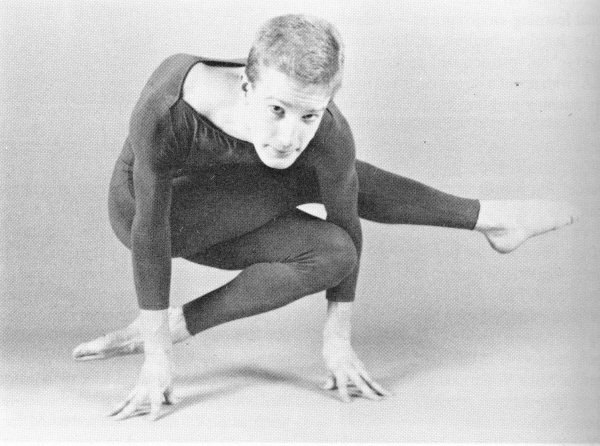
(Photo by Dona Compton) |
Page 18 Winter 1987-88
|
Menes'
Body Is Just Another Prop
Menes
Puts Performance Philosophy on Paper by Russ Kaufman
The
scene is the "Sensations of '86" show at the IJA's 1986
convention in
Displaying
imaginative use of hands and body, the routine weaves its way through
playfulness, absurdity, innocence and picture-perfect virtuosity. It's
as if he has written the book on the unlimited possibilities of three
ball artistic manipulation. The final pages are eloquent, with a
flurry of bounces between the legs while dancing. Then everything
draws together into a nonchalant pose with the three balls together,
the music ending precisely at that point. The audience jumps, to its
feet in roaring applause.
It's
new for the audience, but it's the result of 10 years juggling
experience and study under the likes of Michael Moschen and Tony
Montanero for 24-year-old Menes. Juggler's World caught up with
him at his home in Mendham, New Jersey, where he is performing and
writing. An interview follows:
JW:
The only other standing ovation that night in
MM:
It's funny, because I often don't think of myself as a juggler at all.
When I go to conventions I get intimidated. I often think, "Glad
I'm not a juggler, that 'looks too hard!" I try to
keep in mind that there is a very big difference between "doing
something impressive" and "leaving an impression." The
things which leave an
impression are often, but not necessarily, easier than the things
which are impressive.
My
three ball routine is somewhat of an illusion. The juggling in it
isn't that hard compared to what some other people are doing. But
I'm juggling many parts of the body in different positions
juxtaposed to the three objects. If you consider the body as a
juggling prop, then I suppose I am a juggler and it is really a four
object routine! I'm
writing a book called Juggling and the Theory of Relativity covering
methods I use - architectural/choreographic secrets, emotional
pace-changing, performance secrets and psycho-physical performance.
JW:
Tell us more about the book.
MM:
Writing a book, I'm learning, is a
lot like a well-thought-out juggling routine: It takes a lot of
reworking, care and affection. I enjoy writing. It's something I'm
compelled to do constantly. I
keep writing on different subjects training,
the craft and performing, the business end of things. I tend to
write about the things which
MM:
Yes, but philosophy is a dangerous word. I've attempted to keep my
teaching and writing non-technical, simple and straightforward. My
goal is to go through general principals and end up with useful tools
in concrete and practical situations. The
book is aimed at juggling as a starting point and as a metaphor. I
hope that I can have the book come together in such a way that it can
be useful to people even outside of literal juggling circles, those
who have to juggle problems, people and circumstance. In that way I
hope to tap a larger market and bring juggling to the masses by using
it as a figurative model.
JW:
What do you think of the work of most jugglers today?'
MM:
I've learned to avoid crusading for a cause. I think that if I can
focus on my work and be responsible for making it top quality that
those kinds of questions will be answered as time goes on by what many
continued |

(Photo by Dona Compton) |